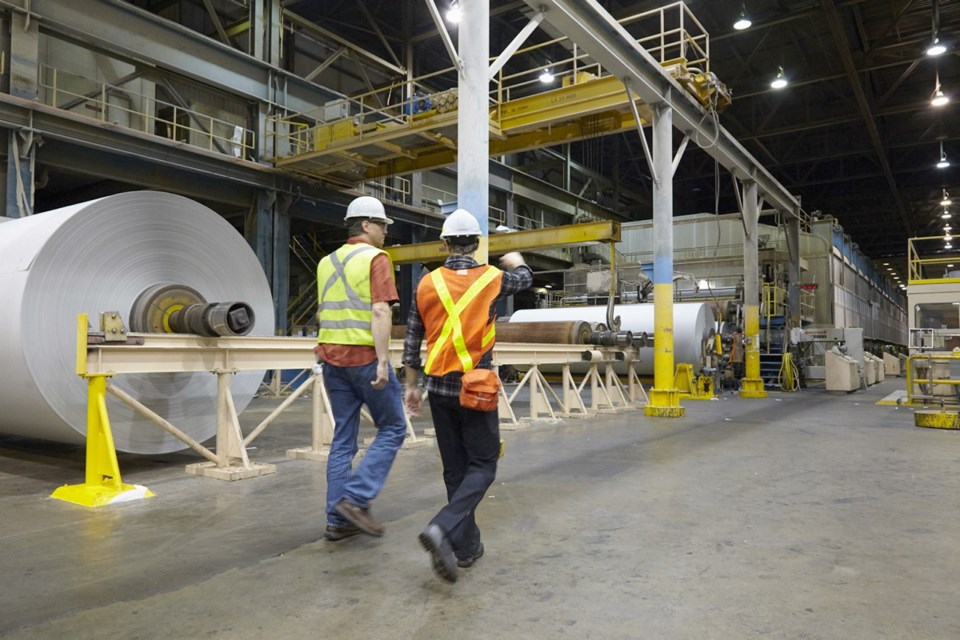 The cabinet decision to exempt the Catalyst Paper sale from a requirement the government imposed last year was made because the purchaser refused to meet it.
The cabinet decision to exempt the Catalyst Paper sale from a requirement the government imposed last year was made because the purchaser refused to meet it.
The government relented in the belief the deal is the best possible outcome.
The requirement was imposed during a financial crisis to protect pensioners, and it became a sticking point during subsequent negotiations, a government official said.
The official confirmed how important the pension-plan shortfall became during the negotiations among Catalyst, the new owner Paper Excellence and the provincial government.
Paper Excellence, a B.C.-based company owned by Indonesian interests, balked at the government’s stance, the official said.
During negotiations last fall, the company took the position that its purchase of Catalyst could not be completed if the government insisted the pension-plan shortfall had to be paid off.
As noted here Wednesday, a cabinet order was signed last week that exempts the sale from that requirement, a few days before Premier John Horgan attended a celebration of the deal this week at the company’s Crofton mill.
The requirements were imposed last summer during a financial crisis that Catalyst was enduring, partly due to U.S. tariffs on some of its products.
The government was concerned about any breakup or reorganization. The goal was to keep Catalyst, as a corporate entity that operates three big coast pulp and paper mills and employs 1,500 people, whole.
So in July, Horgan announced a specific Catalyst pension regulation requiring the company to fund its outstanding pension obligations “immediately,” in the event of any sale, in whole or in part.
The official said that was designed as a “speed bump,” a deliberately imposed obstacle to any breakup or transfer of ownership.
The company has struggled for years in the declining paper industry. Poor performance contributed to a deficit in the pension plan for salaried employees. It has been short for the past 17 years.
When Catalyst went into creditor protection in 2012, it was pegged at $116 million.
It has since been whittled down, but still stands at $42 million as of the last valuation in 2017.
The gains are partly due to solid returns on the plan’s investments.
But they also stem from people cashing out around 2012 because the plan’s future looked so dire.
The threat of tariffs faded and some optimism developed when Paper Excellence got interested in buying it.
The sale was announced in October. The official said that Paper Excellence has purchased all the shares in Catalyst, but Catalyst still exists as a company, one with a new parent company. That’s significant in terms of the pension obligations.
Considering it was another B.C. company with other operations in Canada and that it planned to keep the operations intact, the government was inclined to favour the deal.
It was also encouraged by the presence of Brian Baarda as Paper Excellence CEO. He was formerly a senior executive at Timber West and Catalyst.
But Paper Excellence said it couldn’t close the deal if the regulation applied. The specially tailored pension regulation was the topic of extensive negotiations.
A compromise developed. Paper Excellence has guaranteed that it will backstop Catalyst’s continued pension-plan payments and step in if there are any changes or if Catalyst can’t meet obligations.
That was enough to prompt the cabinet order to exempt Catalyst from the previous order to pay off the shortfall.
So the ongoing payments from the company into the plan will continue, but the deficit from past years is still on the books.
And the speed bump is still there to hamper any other corporate moves in the future that change the ownership of the mills.
The government’s decision to waive its insistence that the shortfall be paid in full made way for a deal that provides better security than existed previously. But the pension plan is still underfunded. Its future depends on continued strong returns and better performance by the company.
The Crofton mill turns a profit, and the official said there is a two-year plan to rejuvenate the Port Alberni and Powell River mills’ financial performance.
It will take at least that long to determine if the government’s relaxation of its initial demand was the best call.



